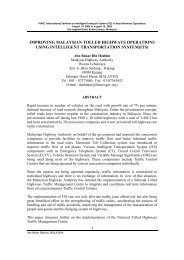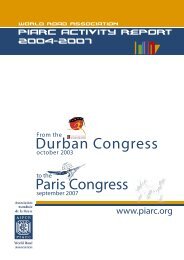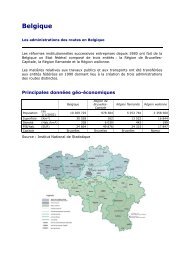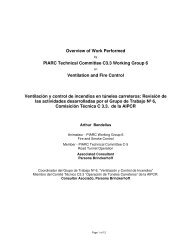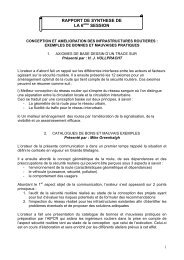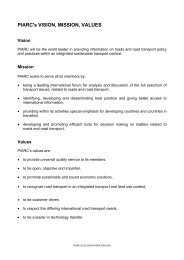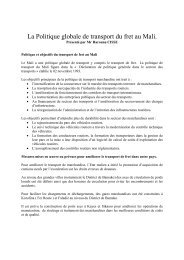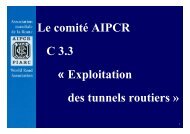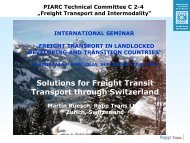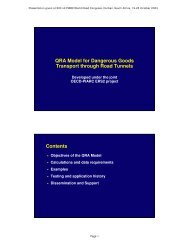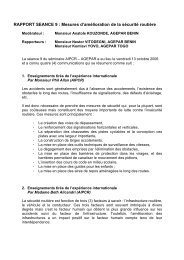General proceedings - Association mondiale de la Route
General proceedings - Association mondiale de la Route
General proceedings - Association mondiale de la Route
Create successful ePaper yourself
Turn your PDF publications into a flip-book with our unique Google optimized e-Paper software.
• The earmarked tax system was expan<strong>de</strong>d and reinforced to its current size of 5.7 trillion<br />
Yen (US$48 billion) and inclu<strong>de</strong>s both national and local budgets. The toll road system<br />
incorporated the pooling system and has <strong>de</strong>veloped the comprehensive toll expressway<br />
network of more than 8,000km.<br />
• Nowadays, these systems are being modified. The public corporations for toll highways<br />
were recently privatized. In December 2006 the prime minister <strong>de</strong>ci<strong>de</strong>d to generalize the<br />
earmarked tax and concrete measures will be discussed in 2007.<br />
• Japan now has an approximately 1,189,000km road network that inclu<strong>de</strong>s 7,800 km of<br />
expressways and 54,000km of national highways and 128,000km of prefecture roads.<br />
However, about 40% of the p<strong>la</strong>nned expressway network is either un<strong>de</strong>r construction or<br />
at the p<strong>la</strong>nning level, and there are daily traffic congestions in <strong>la</strong>rge city areas and on<br />
many national routes.<br />
• Development of the road network require <strong>la</strong>rge scale financing and stable financing.<br />
• Beneficiaries from road use must bear the bur<strong>de</strong>n<br />
• When a country expects an increase in traffic <strong>de</strong>mand in the future, earmarked tax<br />
systems can be effective because tax revenues re<strong>la</strong>ted to automobiles increase in<br />
proportion to traffic <strong>de</strong>mand.<br />
• It is possible to introduce toll road systems to cover the cost of <strong>de</strong>velopment even in<br />
countries with low economic growth rates with some assistance from the government as<br />
long as traffic <strong>de</strong>mand is above certain levels.<br />
• It is important that stable <strong>de</strong>velopment and maintenance p<strong>la</strong>ns are practiced with<br />
corroboration of the earmarked tax system and toll road system.<br />
Title: The importance of infrastructure investments in the urban agglomerations cities<br />
of Africa<br />
Author & Presenter: Mr. Aka Assafou (pictured), Secretary <strong>General</strong>, African<br />
<strong>Association</strong> of Public Transport (UATP)<br />
The presenter highlighted on the role of African<br />
<strong>Association</strong> of Public Transport (UATP) and its<br />
objectives that are to: Gather all the actors of urban,<br />
suburban, regional and interregional public transport of<br />
persons and goods at the scale of the continent; Lead<br />
the necessary reflections to <strong>de</strong>velop organised public<br />
transport in Africa taking into account the social and<br />
economical context of each region; Promote a better<br />
mobility of persons and goods at African scale;<br />
Reinforce Africa voice insi<strong>de</strong> the International <strong>Association</strong> of Public Transport (UITP) and<br />
generally at international level. He emphasized on challenges that might result into urban<br />
<strong>de</strong>mographic growth. These inclu<strong>de</strong>: Urban sprawling; uncontrolled urbanisation; poorest<br />
and <strong>la</strong>bour popu<strong>la</strong>tion at the periphery of the towns. Lack of transportation infrastructure<br />
results into problems such as <strong>la</strong>ck of accessibility of basic services for the poorest;<br />
congestion; pollution and road insecurity.<br />
19



